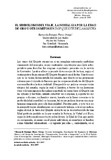Mostrar el registro sencillo del ítem
El simbolismo del viaje, la nostalgia por la edad de oro y otros mitos en Don Quijote de la Mancha
| dc.rights.license | http://creativecommons.org/licenses/by-nc-sa/3.0/ve/ | |
| dc.contributor.author | Flores Ortega, Bernardo Enrique | |
| dc.date.accessioned | 2009-01-21T22:53:23Z | |
| dc.date.available | 2009-01-21T22:53:23Z | |
| dc.date.issued | 2009-01-21T22:53:23Z | |
| dc.identifier.uri | http://www.saber.ula.ve/handle/123456789/26582 | |
| dc.description.abstract | Los viajes del Quijote reúnen en sí un complejo entramado simbólico claramente diferenciado, cuyos contenidos constituyen una clave interpretativa para descifrar los enigmas espirituales presentes en la novela de Cervantes. La obra ofrece y permite diversos ejes de lectura, según el sentimiento o la pasión que El Quijote despierte en el lector. Uno de esos ejes es la visión desencantada del mundo, que deriva en un pesimismo extremo por el cúmulo de fracasos que las empresas idealistas del Quijote acarrean frente a la dura realidad. Otro posible eje pudiera ser una visión utópica del mundo, según la cual el hombre, a través de un heroísmo ético y de una rigurosa disciplina espiritual, tal como hace el Quijote con sus ayunos y desvelos, intenta construir en sí mismo, y, a partir de sus propios esfuerzos, un hombre nuevo, basado en la firme creencia en la perfectibilidad moral del ser humano; tal visión pudiera derivar en un optimismo exagerado pese a la dura realidad. Por otra parte, y esta va a ser la perspectiva que abordaremos en el presente trabajo, está el eje mítico, según el cual la tarea del Quijote consiste en la reconstrucción de una Edad pretérita perdida en la que reinaba la Justicia, la Virtud y el Bien, según lo determinaba un estricto orden divino: la Edad de Oro, que puede ser recuperada, al menos en el plano individual, al someterse el hombre a una voluntad sobrenatural —y signado por ella—, simbolizada, en el relato del Quijote, por Dulcinea del Toboso, en quien se encarnan los más altos ideales de belleza y virtud y que impulsa todas las acciones del "héroe"; se trata, sin duda, de una visión nostálgica del hombre, que padece en su fuero interno de un profundo sentimiento de pérdida, de exclusión o de caída de un estado de gracia originario. | es_VE |
| dc.language.iso | es | es_VE |
| dc.rights | info:eu-repo/semantics/openAccess | |
| dc.subject | Cervantes | es_VE |
| dc.subject | El viaje | es_VE |
| dc.subject | Mitos | es_VE |
| dc.subject | Edad de Oro | es_VE |
| dc.subject | Quijote | es_VE |
| dc.title | El simbolismo del viaje, la nostalgia por la edad de oro y otros mitos en Don Quijote de la Mancha | es_VE |
| dc.title.alternative | The symbolism of the journey, the nostalgia for the golden age and other myths in Don Quixote | es_VE |
| dc.type | info:eu-repo/semantics/article | |
| dc.description.abstract1 | The travels of the Quixote gather a complex symbolic structure that is clearly differentiated; its contents constitute an interpretative key to solve the spiritual enigmas that are present in Cervantes’ novel. The novel offers and allows diverse reading levels; according to the feeling or passion that the Quixote awakens in the reader. One of those levels is the disenchanted vision of the world. Another level could be the utopian vision of the world, according to which a man; through an ethic heroism and spiritual strength; tries to build within himself; and, from his own efforts, a new man based on the firm belief of the moral perfectibility of human being. Such vision could derive in an exaggerated optimism despite the hard reality. On the other hand; this being the perspective that will be approached in this work; there is the mythical level, by which the Quixote’s task consists in the reconstruction of a lost past Age that was reigned by Justice, Virtue, and Good, as it was determined by a strict divine order: the Golden Age; that can be recovered at least in the individual level, when a man submits to a supernatural will –and signed by it-; symbolized in Quixote’s tale by Dulcinea del Toboso, who represents the highest levels of ideal beauty and virtue, and that impulses all of the “Hero’s” actions; this is without a doubt a nostalgic vision of a man, that suffers from a deep feeling of loss inside, of exclusion, or a fall, from an originating state of grace. | es_VE |
| dc.description.colacion | 153-172 | es_VE |
| dc.description.email | floresortega@hotmail.com | es_VE |
| dc.publisher.pais | Venezuela | es_VE |
| dc.subject.centroinvestigacion | Centro de Investigaciones Jurídicas (CIJ) | es_VE |
| dc.subject.facultad | Facultad de Ciencias Jurídicas y Políticas | es_VE |
| dc.subject.keywords | Cervantes | es_VE |
| dc.subject.keywords | The journey | es_VE |
| dc.subject.keywords | Myths | es_VE |
| dc.subject.keywords | The Golden Age | es_VE |
| dc.subject.keywords | Quixote | es_VE |
| dc.subject.pais | Venezuela | es_VE |
| dc.subject.publicacionelectronica | Revista Dikaiosyne | es_VE |
| dc.subject.seccion | Revista Dikaiosyne: Artículos | es_VE |
| dc.subject.thematiccategory | Ciencias Jurídicas y Políticas | es_VE |
| dc.subject.tipo | Revistas | es_VE |
| dc.type.media | Texto | es_VE |
Ficheros en el ítem
Este ítem aparece en la(s) siguiente(s) colección(ones)
-
Dikaiosyne - Nº 020 Año XI.
enero - junio, 2008



